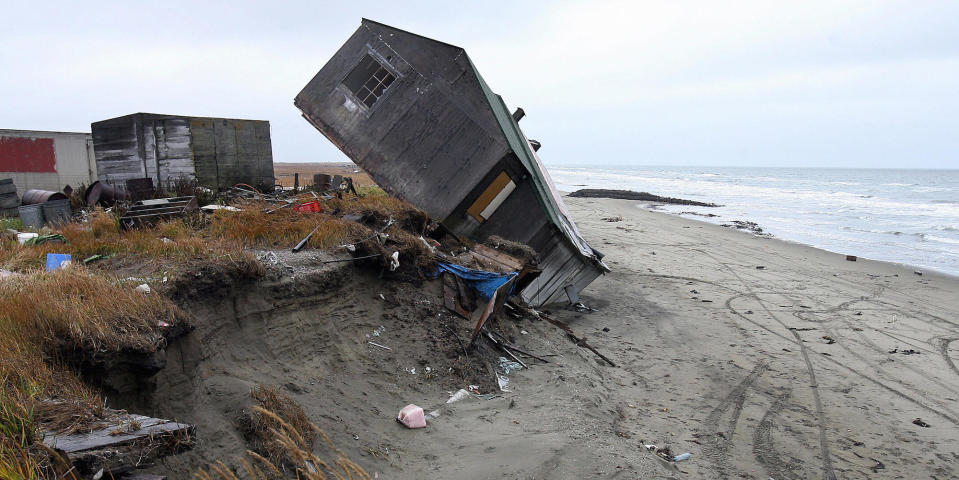Climate Change Is Spoiling the Crops on Right-Wing Content Farms

One of the most remarkable places I have visited in the course of business was Shishmaref, a small Native village on a barrier island in the Chukchi Sea in arctic Alaska. Because of complications due to climate change, Shishmaref is gradually being devoured by the Chukchi Sea. The island is eroding because the permafrost that was its fundamental foundation is disappearing and because the ocean doesn't freeze as long and as hard as it used to freeze.
Since the Chukchi Sea is where typhoons eventually go to die, and since they no longer can beat themselves to death over deep sea ice, the storms regularly tear great chunks out of the island. Houses have collapsed. You can see the legacy of the ongoing losing battle against the winds and tides in the hunks of the previous seawalls that are strewn around the rocky beach.
People have been living in Shishmaref for over 400 years. On Friday, the residents of Shishmaref voted (again) to abandon their village rather than try to save it from the merciless pounding that doesn't seem to promise to get better any time soon. The Alaska Dispatch News covered the balloting.
The vote is significant, said Sally Russell Cox, a state planner who is working with Shishmaref and other communities at risk of being lost as their land crumbles away. "It is the community's expression of what they want to do," Cox said. "If they want to start moving forward with agency support on relocation, the vote is really what triggers that support." Relocations cost millions of dollars but the project can be broken into stages completed over time, as the village of Newtok is doing. The vote wasn't overwhelming but it appears voters on both sides of the issue recognize the village is eroding, even those who opted to protect what they have, Barr said. In October 1997, a big storm gobbled up more than 30 feet of the island's north shore. Fourteen homes and the National Guard Armory had to be moved, and five more homes were relocated in 2002, according to the state Division of Community and Regional Affairs. The island is only 4 miles long and some parts are just one-quarter mile wide, Barr said. Ten to 30 feet of shore are being washed out a year and the village eventually will have to move, she said.
I spent a week there, talking to as many people as I could. The older folks told me about growing up as subsistence hunters, tracking musk ox on land and spending long weeks out on the ice, catching seals and fish and ducking the occasional polar bear. They joked with me about using what they called "the Eskimo freezer," burying their meat in the permafrost, which acted like a natural refrigeration unit. This is another thing that climate change has cost them. The younger kids showed me how they carved things out of whatever bones were still available to them. At the end of my stay, I won $150 in the weekly Bingo night at the town center, which was set far enough back from the ocean that it hadn't been swallowed yet.

Nobody in Shishmaref is a climate denialist. In fact, the people I talked to were amazed that the simple scientific fact of climate change even was a matter for debate anywhere in the lower 48. They have reckoned, of course, without The Daily Caller, the wizened oak tree on which Tucker Carlson has hung the entrails of a once-promising career.
TDC would like you to know that the fault lies in 150 years of big government meddling and, its voice dropping to a whisper, in a sense of dependency fostered in the locals, who now expect Uncle Sugar to bail them out. Go hunt a seal on the ice and come back and talk to me. (Did you know that Shishmaref wasn't even an Alaskan name? Burn!) And, as the good folks at DeSmog Blog tell us, Dan Kish and the Institute for Energy Research, also cited in the piece, are fronts for the usual suspects in the extraction industries. (The Institute was founded by a former Enron executive, which is still a golden line on a resume in some corporate circles, primarily to lobby against investments in green energy.)
As we have more and more climate refugees, I will guarantee you that this will become the conservative response to them: Why'd you ever live there in the first place, and the money's simply not there. People will be told to sink or swim who cannot afford to do either one.
Click here to respond to this post on the official Esquire Politics Facebook page.
You Might Also Like

